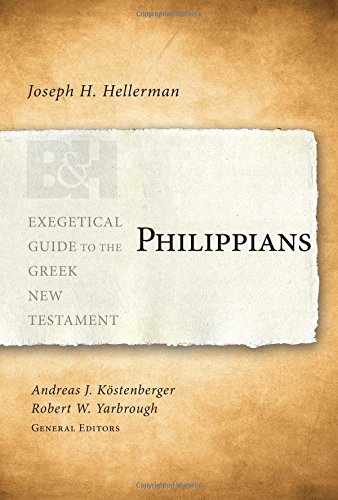 Earlier, we reviewed Joseph Hellerman’s Philippians volume in the Exegetical Guide to the Greek New Testament series from B&H Academic. Dr. Hellerman is Professor of New Testament Language and Literature at Talbot School of Theology.
Earlier, we reviewed Joseph Hellerman’s Philippians volume in the Exegetical Guide to the Greek New Testament series from B&H Academic. Dr. Hellerman is Professor of New Testament Language and Literature at Talbot School of Theology.
We tracked him down to interview him about his book because, as a site devoted to exegesis, we wanted to know from someone who has written an exegetical volume what the fruit of such labor is. You’ll find much to learn in this interview about exegesis, Greek, preparing for sermons, and the experience of studying Scripture closely in its original language.
Exegetical Tools
These EGGNT volumes are excellent for readers trying to improve their Greek. Which types of readers do you expect to profit most from this volume, and in what ways?
Joseph Hellerman
I’m not sure that improving one’s Greek is at the top (or even near the top) of the objectives of the series. It was certainly not a goal of mine. Dedicated users of the EGGNT volumes will no doubt improve their Greek just by being in the Greek text and using a Greek-oriented secondary resource like EGGNT. But I have assumed that my target audience already has a relatively solid grasp of the language, namely, the ability to do a basic translation of the text, along with some recollection of the grammatical categories learned in intermediate Greek in Bible school or seminary.
ET
Did you learn much about Greek throughout the project? Anything particularly useful or helpful to remember?
Hellerman
 I am a social historian by training (Ph.D. History, UCLA) and all my previous scholarship focused in that area (e.g., The Ancient Church as Family, Reconstructing Honor in Roman Philippi, When the Church Was a Family, Embracing Shared Ministry). But my teaching assignment at Talbot is primarily in the area of intermediate Greek grammar and exegesis. For this project I reviewed most of the recent developments in Koine Greek scholarship (aspect, tense, deponency, discourse grammar, register, etc.), although, as you note in #4, below, the EGGNT series takes a rather traditional approach to the topic, so that not many of these current findings cash out exegetically in the volume that I wrote.
I am a social historian by training (Ph.D. History, UCLA) and all my previous scholarship focused in that area (e.g., The Ancient Church as Family, Reconstructing Honor in Roman Philippi, When the Church Was a Family, Embracing Shared Ministry). But my teaching assignment at Talbot is primarily in the area of intermediate Greek grammar and exegesis. For this project I reviewed most of the recent developments in Koine Greek scholarship (aspect, tense, deponency, discourse grammar, register, etc.), although, as you note in #4, below, the EGGNT series takes a rather traditional approach to the topic, so that not many of these current findings cash out exegetically in the volume that I wrote.
ET
Having researched and written this volume, what advice would you have for pastors preaching on a weekly basis as they try to work through the original language of their passages each week? Are there tips to speed up the process of translation and exegesis, or particularly helpful resources to own and use?
Hellerman
I am a preaching pastor (part-time, I’m in the rotation monthly), as well as a full-time seminary professor. My own approach to sermon preparation is to consult the two best commentaries in print on a passage , along with any topical/theological resources necessitated by the text. My years reading and teaching Greek give me an advantage, of course, over most full-time pastors. This, I think, is where the EGGNT volumes become very handy. Because we’ve packed the findings of so many secondary sources into EGGNT, it can be a “one-stop shop” for the linguistic aspect of sermon preparation. No need to turn to TDNT—virtually everything of importance that Kittel and his contributors says about Philippians is in the EGGNT volume. No need to open BDAG—both BDAG’s glosses and definitions of all key terms are, again, reproduced in the EGGNT volume. This liberates busy pastors from needed to fumble around with piles of secondary source materials on their desks, so that they can focus on the biblical text itself.
ET
One thing I noted in my review is that this series focuses on the clause level, or the sentence level at most, and that there isn’t much interaction with modern linguistics (I assume that’s a design of the series). What do you find most helpful from modern linguistics that you think could supplement your close grammatical analysis of Philippians?
Hellerman
You are correct, Todd, in your assessment of the general approach of the series. However, I expended a good bit of effort at the discourse level, to connect sentence-to-sentence and paragraph-to-paragraph. I suspect that I have not do so in the kind of systematic, theoretical way that will satisfy the proclivities of the linguistic specialists in the guild, although I did draw directly upon Runge’s Discourse Grammar and, especially, upon Reed’s discourse analysis of Philippians. I found these two resources to be most helpful among more linguistically oriented sources. One of the most contentious areas of debate—that related to time and tense in the indicative—was a moot point exegetically (see the volume’s Introduction).
ET
Are there any practical or devotional points you pulled from Philippians while working through the exegesis that were particularly memorable? Would you mind sharing?
Hellerman
I was impressed, once again, with Paul’s single-minded passion for the gospel and for people. “Single-minded” might sound like an odd description of a person with a twofold passion like Paul’s, but somehow the great apostle was able to hold the cognitive/theological and the personal/relational together in his ministry.
Thanks so much to Dr. Hellerman for taking the time to share with us about the fruits of his exegetical labor. We hope his work Philippians will be a monument to the church and a lesson in how the languages can fuel our knowledge of Scripture and our love for it.
Find Philippians here on Amazon.

One comment